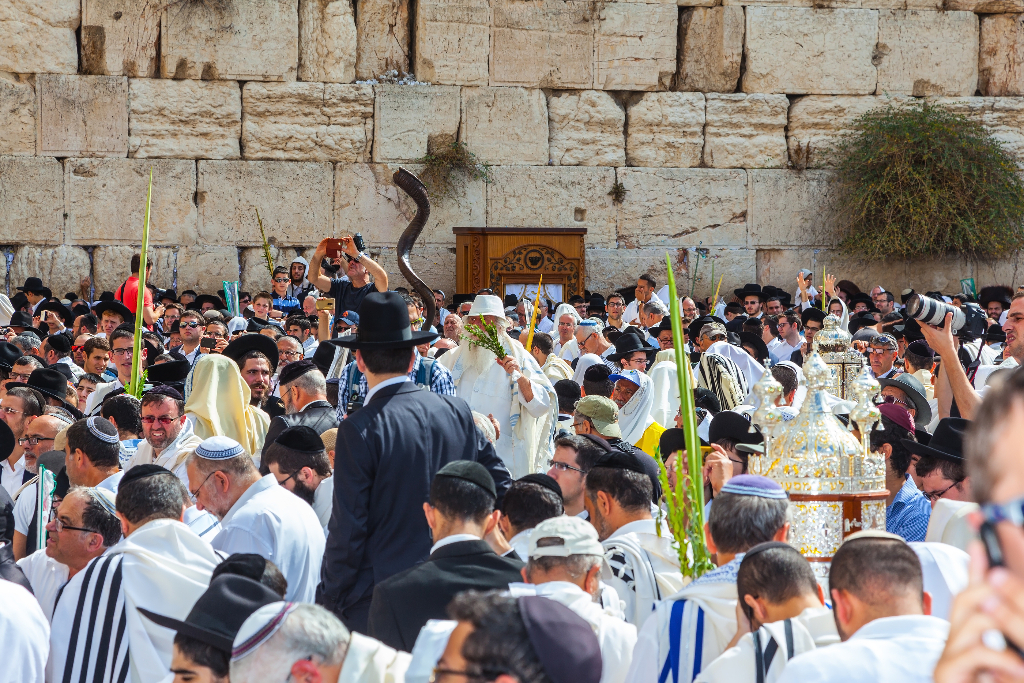As I explained in my last article, I wrote this series of articles on Who is the True Israel because of the recent rise of Christian antisemitism.
After careful examination, study, and contemplation, I’m convinced Replacement Theology is the root of such Christian antisemitism. That’s why in the last article, I briefly described Replacement Theology, and then I explained Romans 2:28-29, which has historically been used to promote Replacement Theology.
In this article, I continue examining the New Testament verses that have been frequently misinterpreted, which have given rise to Replacement Theology. This article examines Romans 9:6-8 and Galatians 6:15-16.
Romans 9:6-8
Paul said, “But it is not as though the word of God has failed. For they are not all Israel who are descended from Israel; nor are they all children because they are Abraham’s descendants, but: ‘THROUGH ISAAC YOUR DESCENDANTS WILL BE NAMED.’ That is, it is not the children of the flesh who are children of God, but the children of the promise are regarded as descendants” (Rom. 9:6-8).
Once again, if you closely examine the context of Romans 9, it’s clear Paul was speaking directly to the Jews. For example, consider the objector in Romans 9:14, whom Paul addressed by the statement, “What shall we say then? There is no injustice with God, is there? May it never be!” (Rom. 9:14). The objector was not a non-Calvinist resisting a deterministic view of God’s sovereignty as some have claimed. Rather, it was a judicially hardened Jew who was deeply offended at the idea that salvation is only by grace through faith in Jesus the Messiah and not by works of the law.
Paul, gripped by a burden for the Jewish people to be saved, anticipated a charge of injustice against God from a first-century Jew. Paul knew if the Jewish people of his day viewed God as unjust and if they believed that His Word had failed, it would hinder them from saving faith in Jesus the Messiah. This was Paul’s burden in Romans 9:14. Not trying to answer whether God was unjust for preselecting the elect before time and creation in His secret councils and reprobating the rest. Such a thought was not even on a first-century Jew’s radar.
To comprehend Paul’s thinking when he penned Romans 9, it’s vital to understand the Jewish soteriology (doctrine of salvation) of Paul’s day. The overwhelming majority of Jewish people believed they were automatically children of God and would go to heaven when they died because they were descendants of Abraham, were circumcised, and were thus partakers of the Abrahamic Covenant. Both John the Baptist and Jesus confronted this wrong belief (Matt. 3:7-9; John 8:39-44).
Jesus’ main point in John 8:39-44 was this: Salvation doesn’t depend upon whether you are a physical descendant of Abraham, but whether you have become a child of God by regeneration through faith in Him. If you are not born again, then the devil is your father, even if you are from the lineage of Abraham. Of course, the same could be said to Gentiles.
When you carefully examine Romans 9:6-13, it’s clear Paul was addressing a first-century Jewish assumption that salvation was automatic because they had a chosen bloodline in Abraham.
With this background established, let’s go back to Romans 9:6-8. To make his case to the Jews that they are not automatically saved because they are descendants of Abraham and partakers of the covenant that bears his name, Paul stated, “For they are not all Israel who are descended from Israel” (Rom. 9:6).
Throughout history, this verse has created much confusion but it’s actually quite simple to comprehend. The phrase “descended from Israel” refers to all the Jewish people who are from Abraham’s lineage and are partakers of the Abrahamic Covenant by circumcision. Conversely, the phrase “they are not all Israel” looks ahead to Romans 11:16-24, where Paul used the analogy of the rich root of the olive tree, having both natural and wild branches grafted into it.
After carefully study of this passage, I believe the rich root of the olive tree is the Jewish Messiah Jesus and all the promises made to Him through the Abrahamic, Davidic, and New Covenants.
This brings us to one of the most important but neglected names given to the Messiah. Isaiah, speaking of the Messiah, said, “You are My Servant, Israel, in Whom I will show My glory” (Isa. 49:3). One of the Messiah’s names is Israel. As the Messiah, Jesus is the true Israel—the prototype of what the Jewish nation is to become. He is the One to whom all the promises were made and fulfilled. In fact, Jesus prevailed in the same areas where ancient Israel failed. Like Israel, Jesus was called out of Egypt and tested in the wilderness for forty days (Matt. 2:13-15; Matt. 4:1-11). Yet instead of failing God’s tests, Jesus prevailed—qualifying Him to possess the Promised Land in the Millennial Kingdom and to rule the earth as God.
Have you ever really contemplated that Jesus Christ is Jewish? I have seen several movies which featured a blue-eyed Jesus who looked more like an American right out of Hollywood than a Jew from the Middle East. Jesus Christ, known as Yeshua to the Hebrews of His day, was born a Jew, died a Jew, and will return as a Jew. He observed all the customs of the law, studied the Torah, went to the temple, and celebrated the Jewish feasts. When Jesus died on the cross in Jerusalem, He was fulfilling the Jewish festival of Passover. Jesus Christ is the Lamb of God who was slain for the sins of the world.
Three days later, when Jesus rose from the dead, He fulfilled the Feast of First-Fruits by becoming the “first fruits of those who are asleep” (1 Cor. 15:20). When Jesus came the first time to tabernacle among men (John 1:14), it was a partial fulfillment of the Feast of Tabernacles. When Jesus returns the second time as the reigning King, He will completely fulfill this festival as “all the nations . . . go up from year to year to worship the King, the Lord of hosts, and to celebrate the Feast of Booths [the Feast of Tabernacles]” (Zech. 14:16, emphasis mine).
Jesus Christ is still the King of the Jews (John 18:33-37). He has even maintained His Jewish identity in heaven. When John was taken into the heavenly throne room, he described Jesus as “the Lion that is from the tribe of Judah, the Root of David” (Rev. 5:5).
Here’s my point: The rich root of the olive tree in Romans 11 is the Jewish man Jesus Christ and all the promises made to Him through the Abrahamic, Davidic, and New Covenants. These covenant promises are scattered throughout the law and the prophets.
Jesus Christ is the One to whom both Jews and Gentiles must be grafted into to be saved and blessed. This means the church has not replaced Israel; we have been grafted into Israel.
The natural branches who are grafted into the olive tree are the Jewish people who believe Jesus is the Messiah. The natural branches who were broken off are the Jewish people who rejected Jesus as the Messiah. And finally, the wild branches who are grafted into the rich root of the olive tree are born-again Gentiles, who have put their faith in Jesus Christ. These have been shown mercy due to the unbelief of many Jewish people. Jesus Christ is the One to whom both Jews and Gentiles must be grafted into to be saved and blessed. Therefore, when Paul stated, “They are not all Israel who are descended from Israel,” he meant not every Jewish person is a natural branch that has been grafted into Jesus Christ and the covenant promises made to Him.
That’s why I prefer the phrase “the Israel within Israel” instead of “the true Israel” to express what Paul conveyed in Romans 9:6-8. The idea is, from the beginning of church history, there has been a Jewish remnant within Israel who has believed Jesus is the Messiah. And as Gentiles, we have been grafted into Jesus Christ and are now partakers with this “Israel within Israel” of the Jewish Messiah and the promises and blessings of the New Covenant.
Galatians 6:15-16
Paul said, “For neither is circumcision anything, nor uncircumcision, but a new creation. And those who will walk by this rule, peace and mercy be upon them, and upon the Israel of God.”
Who exactly is “the Israel of God”? Once again, many Gentile Christians take this phrase and boast to others, “The church is the Israel of God. Not the Jewish nation in the Middle East.” But is this what Paul was saying? To be honest, this phrase is very difficult to interpret.
I definitely don’t believe Paul was telling the Gentile church in Galatia, “You are the true Israel.” Instead, Paul was either saying the same thing he expressed in Romans 9:6-8 or he was simply saying, “May peace and mercy be upon Israel, the Jewish nation God established through the Abrahamic Covenant.”
I lean towards the latter interpretation and here’s why. Before making this statement, Paul said what really matters is not if you are circumcised or uncircumcised, but whether you are a new creation by the Spirit of Christ regenerating you. Immediately after saying this, Paul said, “Peace and mercy be upon them.” Who is “them”? It’s those who are a new creation, both Jew and Gentile.
Then Paul said, “And upon the Israel of God.” If the Israel of God is the church, both Jew and Gentile who are new creations, why would Paul use the phrase “and upon”? If Paul meant the Israel of God was the church, he likely would have omitted the phrase “and upon,” and instead said, “For neither is circumcision anything, nor uncircumcision, but a new creation. And those who will walk by this rule, peace and mercy be upon them, the Israel of God.”
For this reason, I believe “the Israel of God” in this verse refers to the Jewish nation in the Middle East that God established by the Abrahamic Covenant.
To be continued . . .


